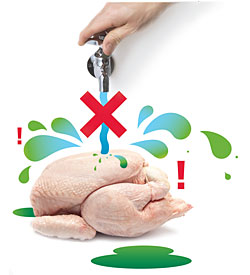We know that hand washing is important to help prevent illness. What about washing meat, poultry, and seafood? The Centers for Disease Control and Prevention says that food safety mistake #3 is washing meat, chicken, or turkey. Why it’s a mistake: Washing raw meat, chicken, turkey, or eggs can spread germs to your sink, countertops, and other surfaces in your kitchen. Those germs can get on other foods, like salads or fruit, and make you sick. Continue reading for tips for keeping your family and friends food-safe by preventing a foodborne illness* (*Note, there is no evidence that coronavirus is a foodborne illness).
A study from the U.S. Department of Agriculture (USDA) demonstrates that individuals are putting themselves at risk of illness when they wash or rinse raw poultry. Participants in the study prepared a raw chicken for cooking and a lettuce salad. Of the participants who rinsed their raw poultry, 60% had bacteria in their sink after rinsing the poultry, and 26% of salads were then contaminated. Even more concerning was that 14% of participants still had bacteria in their sinks after they attempted to clean the sink. Research also tells us that rinsing meat will not make the meat safe to eat; cooking is the only way to ensure meat and eggs are safe to serve to family and friends.
What should consumers do? Cook meat, poultry, seafood and eggs to proper temperatures:
- Beef, pork, lamb, and veal (steaks, roasts, and chops) are safe to eat at 145°F. Let meat rest for 3 minutes before slicing.
- Ground meats (burgers) are safe to eat at 160°F.
- Poultry (whole or ground) is safe to eat at 165°F.
- Seafood is safe to eat at 145°F or when the flesh is opaque and separates easily with a fork.
- Eggs and egg dishes are safe to eat at 160°F or when the yolk and white are firm.
Want more information? Check out these resources:
- Photo novellas and recipes (Drexel University, English only)
- Washing Chicken Spreads Germs (no audio, English only) – CDC
- Todo Cuenta cuando se Trata de Cuidar a su Familia
- Questions about cooking meat, contact the USDA Hotline (1-888-674-6854 toll-free) or online at AskKaren.gov (English and Spanish) or m.AskKaren.gov (Mobile Ask Karen) on your smartphone.
Stay well and food-safe.




